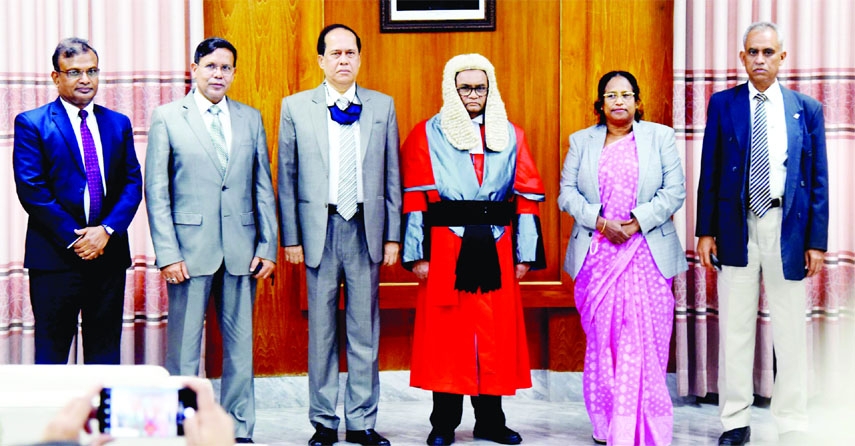
Staff Reporter :
The newly appointed Chief Election Commissioner (CEC), Kazi Habibul Awal, in an instant reaction has described organizing an election as a challenge.
Immediately after taking the oath, the CEC told journalists that arranging polls is a big challenge and a tough job too, but no way to go back with fear.
CEC Awal said after sitting chair we will try to grasp that there is any challenge or not. And observing the situation thoroughly, decisions will be taken.
He said the Election Commission (EC) couldn’t organize polls alone. For this, we need the help of all, so that this great job can be done possible.
He, however, expressed the hope that the EC officials will be able to organize a credible election.
Earlier, the newly appointed CEC and four Election Commissioners took oath at a ceremony held at the Judge’s Lounge of the Supreme Court Sunday.
Chief Justice Hasan Foez Siddique administered the ceremony.
The four ECs are: District and Session Judge (Retd) Begum Rashida Sultana, Brigadier General Ahsan Habib Khan
(Retd), Senior Secretary (Retd) M Alamgir and Senior Secretary (Retd) Anisur Rahman.
The new EC will oversee the 12th National Parliamentary Elections which would be held at the end 2023.
But already there is a big question raised that how the new EC will gain the faith of all political parties as a certain quarter of them have denied the selection process of EC.
Bangladesh Awami League (AL) believes that the new EC will be able to hold a free and fair election with confidence of all political parties.
Awami League Presidium Member Advocate Kamrul Islam said there is no question over the newly appointed EC. They are accepted by all.
He said they have enough power by EC law to hold credible election and they will do it.
Meanwhile, Bangladesh Nationalist party (BNP) has already rejected the appointment of new CEC and four commissioners and demanding the election-time government, saying the party would not take part in the election under Awami League government.
During delivering speech as a chief guest at a programme organized by the Bangladesh Hindu Buddhist Christian Kalyan (welfare) Front at the Dhaka Reporters’ Unity (DRU) Auditorium in the capital on Sunday, BNP Secretary General Mirza Fakhrul Islam Alamgir said, “We are not bothered about the new EC. Our main headache is the polls-time government. “If the Awami League government remains in power, then one can be sure that there will be no election,” he added.
“Our only demand is that the national polls have to be held under a caretaker or non-partisan government.”
The BNP secretary general said that this government must resign and demanded the formation of a neutral EC under a neutral government.
On the other hand, Jatiya Party Secretary General Md Mujibul Haque Chunnu, in a rare reaction, said the newly appointed Election Commission is an Awami League-backed bureaucratic commission. It is to be said that JP is the main opposition in parliament and an Awami alley.
“There is considerable doubt that the EC will be able to conduct fair, impartial and credible elections. Their activities will reveal how neutral they are,” Chunnu said after the Jatiya Party presidium meeting on Sunday.
Over the new EC’s neutrality and arrange a free, fair and credible election, former election commissioner Brigadier General (Retd) Muhammad Sakhawat Hussain said the challenges for the new EC are that to revive the voting system in the country as there is a believe from all quarters — political parties, civil societies and voters — that the voting system of Bangladesh had been destroyed.
He said it is also a big question that how transparently they will be able to organize the election.
Munira Khan, president of Fair Election Monitoring Alliance (Fema), said trust building will be the big challenge for the newly appointed EC.
After issuing a gazette notification, in a quick response to media, CEC Kazi Habibul Awal said they will invite all political party to take part in polls.
He said we want cooperation from every corner, including the government, political parties and civil society.

